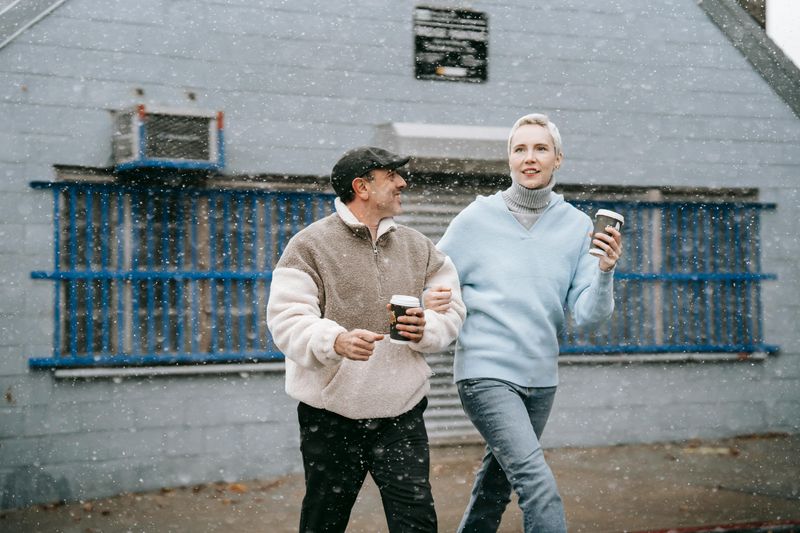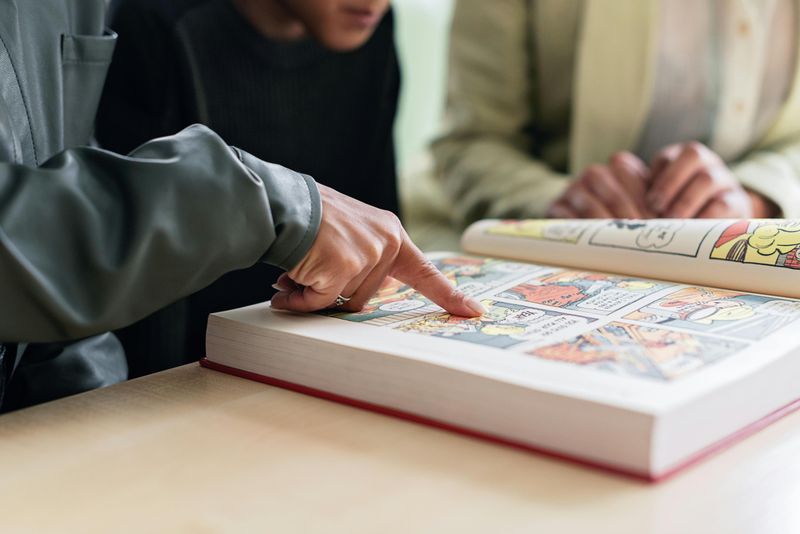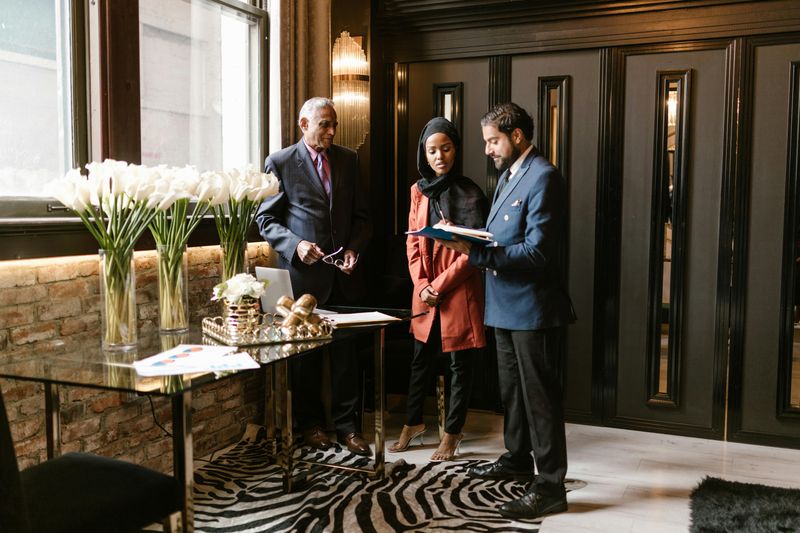20 Weird Things People Say When They’re Bad at Talking to Others

We’ve all been there – that moment when our brain freezes and our mouth produces something utterly bizarre during a conversation. Social awkwardness hits everyone sometimes, but some phrases are telltale signs of someone struggling with the art of chitchat. From weather observations to random animal facts, these verbal oddities can make or break social interactions.
1. Weather Statements of Desperation

When conversation skills abandon ship, the weather becomes a lifeline. “So… the weather exists, huh?” might be the most desperate version of this classic fallback.
Unlike normal weather chat that discusses temperatures or forecasts, this phrasing acknowledges the mere existence of weather, revealing the speaker’s complete conversational bankruptcy. It’s the verbal equivalent of waving a white flag.
Next time you hear someone comment on weather’s existence rather than its qualities, recognize it as the distress signal it truly is – they’re drowning in social anxiety and grabbing the nearest conversational life preserver.
2. The Generic Enjoyment Question

“Do you like… stuff?” ranks among the most gloriously vague conversation attempts ever uttered. The long pause before “stuff” signals the brain frantically searching for literally any topic and coming up empty.
This question reveals someone who knows conversations require showing interest but has completely forgotten how to specify a subject. It’s both endearing and alarming – like watching someone try to bake a cake with only flour.
When you hear this question, the kind response is offering a specific topic rather than highlighting the beautiful trainwreck you just witnessed.
3. The Small Talk Rebellion

Saying “I’m not good at small talk, so… big talk?” is both a confession and a challenge. It’s like admitting you’re socially awkward and philosophically ambitious—all in one breath.
While refreshingly honest, this approach can feel like someone suggesting you skip dating and go straight to marriage. The social equivalent of a cannonball into the shallow end.
People who say this often genuinely prefer meaningful conversations but haven’t mastered the art of transition from pleasantries to deeper topics.
4. The Vague Current Events Reference

This is the classic flounder of someone trying to sound informed but drawing a complete blank. The vague phrasing and awkward pauses betray a mind frantically searching for headlines—or any shred of context to sound vaguely current.
This phrase attempts to prompt the other person to mention specific events, thereby doing the conversational heavy lifting. It’s like throwing a conversational boomerang and praying it comes back with actual content.
The beautiful vagueness works as both a confession of ignorance and a fishing expedition for topics the other person might know about.
5. The Random Animal Fact Offer

It’s the kind of non sequitur that derails any conversation in the best way possible. There’s no lead-in, no segue—just a lizard fact hurtling into the chat like a curveball from the void. It’s chaotic, but undeniably intriguing.
This phrase reveals someone who has completely abandoned conventional conversation paths in favor of sharing their special interest. The beauty lies in its honesty – they’re essentially saying, “I have nothing relevant to discuss, but I do know this cool thing!”
People who offer random animal facts are often hiding fascinating minds behind social awkwardness. Say yes to the lizard fact – you might learn something genuinely interesting!
6. The Conversational White Flag

“I have no idea what to say right now” serves as both confession and surrender. Unlike other awkward phrases that attempt to disguise social discomfort, this one plants a flag directly in it.
The raw honesty can actually break tension, turning an awkward silence into a shared moment of human connection. It’s like admitting you’re lost instead of pretending to know the way.
People who say this might initially seem socially inept, but they’re actually demonstrating emotional intelligence by acknowledging the situation rather than filling space with meaningless chatter.
7. The Food-Based Escape Plan

There’s something universally comforting about someone bypassing small talk to fully commit to chips and dip. It lowers the social stakes instantly—suddenly, you’re not at a networking event; you’re at a snack-centric survival mission.
The phrase works as both humor and honesty – they might genuinely value cheese cubes over chitchat. It’s the verbal equivalent of pointing and shouting “Look over there!” before disappearing into the crowd.
Those who deploy this line are often introverts who’ve developed coping strategies for social events, using food as both comfort and conversation topic when all else fails.
8. The Bread-Brain Confession

Everyone’s mind wanders, but admitting you were thinking about bread is such a random, harmless thought that it’s instantly endearing. It’s like saying, “I’m human—and my brain loves carbs.”
This phrase reveals someone whose mind wanders to random topics during conversation. The specificity of bread makes it endearing rather than offensive – they’re not ignoring you for something important, just carbohydrates.
People who make these confessions often have creative minds that struggle with linear conversation but might excel at unexpected connections and original thinking.
9. The Laugh Timing Uncertainty

Rather than forcing a laugh, the speaker’s honesty calls attention to the unspoken pressure to perform socially. It’s a subtle way of saying, “I’m out of the loop—help me understand.”
This phrase reveals someone who’s analyzing social interaction like a foreign language, trying to decode when specific responses are expected. It’s like watching someone read a conversation manual while participating in one.
Though awkward, this honesty can be refreshing compared to forced laughter. The person is prioritizing authenticity over social smoothness, which has its own charm.
10. The Fast-Forward Request

“I’m bad at this, can we skip to goodbye?” cuts through social pretense with surgical precision. This phrase acknowledges the entire conversation as a formality the speaker wishes to complete as efficiently as possible.
There’s something refreshingly efficient about this approach – like requesting to skip the tutorial in a video game. The speaker values both people’s time enough to suggest abandoning a painful social exercise.
While potentially offensive to conversation enthusiasts, this phrase can be a relief between two socially awkward people who’ve been suffering through small talk, creating an instant bond through shared discomfort.
11. The Obvious Facial Observation

Everyone’s had moments where they want to say something but don’t quite know how, leading to comments that are technically true but wildly unhelpful. This captures that perfectly.
“You have a face… like, on your head” – this phrase reveals someone who understands the concept of compliments or observations but completely misses their execution. It’s like trying to use a social script but reading the stage directions instead of the dialogue.
The beautiful absurdity often breaks tension through shared laughter, creating connection through mutual acknowledgment of the statement’s ridiculousness rather than through conventional conversation.
12. The Strange Animal Comparison

Comparing someone to a cat can be a loaded statement, but adding “in a good way” tries to soften the blow while raising more questions than it settles. It’s the kind of compliment that makes you smile and wonder at the same time.
This comparison reveals someone attempting to express fondness through the safest relationship they know – their pet. The speaker might genuinely mean it as praise, unaware that human-to-animal comparisons require more explanation than they’re providing.
People who make these comparisons often have rich inner associations that make perfect sense to them but need significant translation for others.
13. The Video Game Social Battery

“If we were Sims, I’d be out of social points by now” cleverly uses gaming references to explain introversion. This metaphor transforms social exhaustion from a personal failing into a quantifiable resource management issue.
The gaming analogy reveals someone who understands their social limitations and monitors them carefully. They’re essentially providing a polite warning system about their impending need for solitude.
This phrase tends to resonate with fellow introverts who immediately understand the concept of social energy depletion, creating instant camaraderie between people who share the experience of social battery management.
14. The Random Academic Flex

Dropping a line like this shows a mix of pride and bewilderment—proud of the achievement but questioning its usefulness. It’s the perfect example of oversharing in social situations.
The phrase “for no reason” is particularly telling – the speaker acknowledges the randomness while still hoping their achievement might spark interest. It’s like bringing a chemistry textbook to a dinner party just in case.
People who share these random accomplishments often have fascinating minds full of varied interests but struggle to introduce them organically into conversation.
15. The Philosophical Pigeon Question

“Do you think pigeons know they’re in cities?” launches a profound question about animal consciousness from conversational desperation. This question skips small talk entirely in favor of urban wildlife existentialism.
The beauty of this approach is its genuine curiosity disguised as awkwardness. The speaker might actually want to discuss animal cognition but lacks the social skills to transition to the topic smoothly.
These philosophical curveballs often lead to more interesting conversations than weather talk, assuming the other person engages rather than backing away slowly while maintaining eye contact.
16. The Appliance Emergency Exit

By leaning into the corny pun, “I think I left my fridge running, I should go catch it,” the speaker embraces awkwardness and diffuses tension. It’s humor as a social safety net, inviting laughs while providing an easy exit.
The deliberate badness of the joke signals self-awareness about the social retreat. It’s like saying, “We both know this conversation isn’t working, so I’ll leave with this groan-worthy pun as a parting gift.”
People who use humor as an exit strategy often prefer being remembered for intentional silliness rather than genuine awkwardness – it gives them control over how their social performance is perceived.
17. The Mysterious Relocation Announcement

“I’m going to go stand over there… for a while” announces a physical retreat without providing any logical reason for it. The vague timeframe of “a while” perfectly captures the speaker’s desire to escape without committing to a permanent departure.
This phrase is beautiful in its transparency – they’re not pretending to need the bathroom or get a drink. They’re simply relocating their awkward presence to a different spot in the room.
The lack of explanation invites no follow-up questions, creating a clean conversational break while leaving open the possibility of return when social courage has been recalibrated.
18. The Ancient Laundry Emergency

By specifying “laundry from 2009,” the speaker elevates a routine task to epic proportions. It’s less about actual laundry and more about creatively dodging the moment.
This excuse reveals someone who’d rather be caught in an obvious lie than continue the conversation. The absurdity signals they’re not even trying to be believed – they’re using humor to cushion their retreat.
The vintage year choice suggests both desperation and creativity. Why 2009? The randomness adds a layer of surreal comedy that distracts from the social rejection taking place.
19. The Social Battery Flatline

Using “My social battery just flatlined” is a straightforward way to say, “I’m out of energy.” It’s less about the people around you and more about your limits, offering a kinder explanation for needing space.
The medical metaphor of “flatlined” adds dramatic urgency to what might otherwise seem like rudeness. It frames social departure as a health necessity rather than a choice, making it harder to take personally.
This phrase has gained popularity because it effectively communicates introvert experiences to extroverts. It helps bridge the understanding gap between those who gain energy from social interaction and those who spend it.
20. The Conversation Fast-Forward

By saying “Let’s pretend we had a great conversation and end it here,” the speaker takes control of the interaction, skipping the exhausting middle and moving straight to the amicable conclusion.
The suggestion reveals someone who understands the expected social script but lacks the energy or skill to execute it properly. It’s like suggesting you both agree to have climbed the mountain without actually making the journey.
Despite its awkwardness, this approach has a refreshing efficiency. The speaker values both people’s time enough to suggest cutting to the chase – the social equivalent of reading a movie summary instead of watching it.

Comments
Loading…